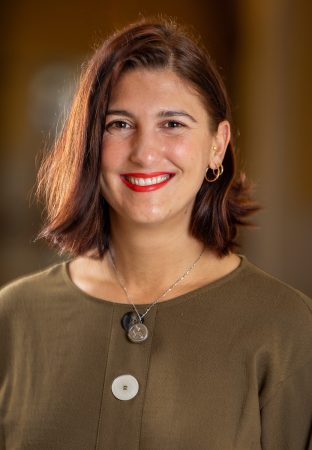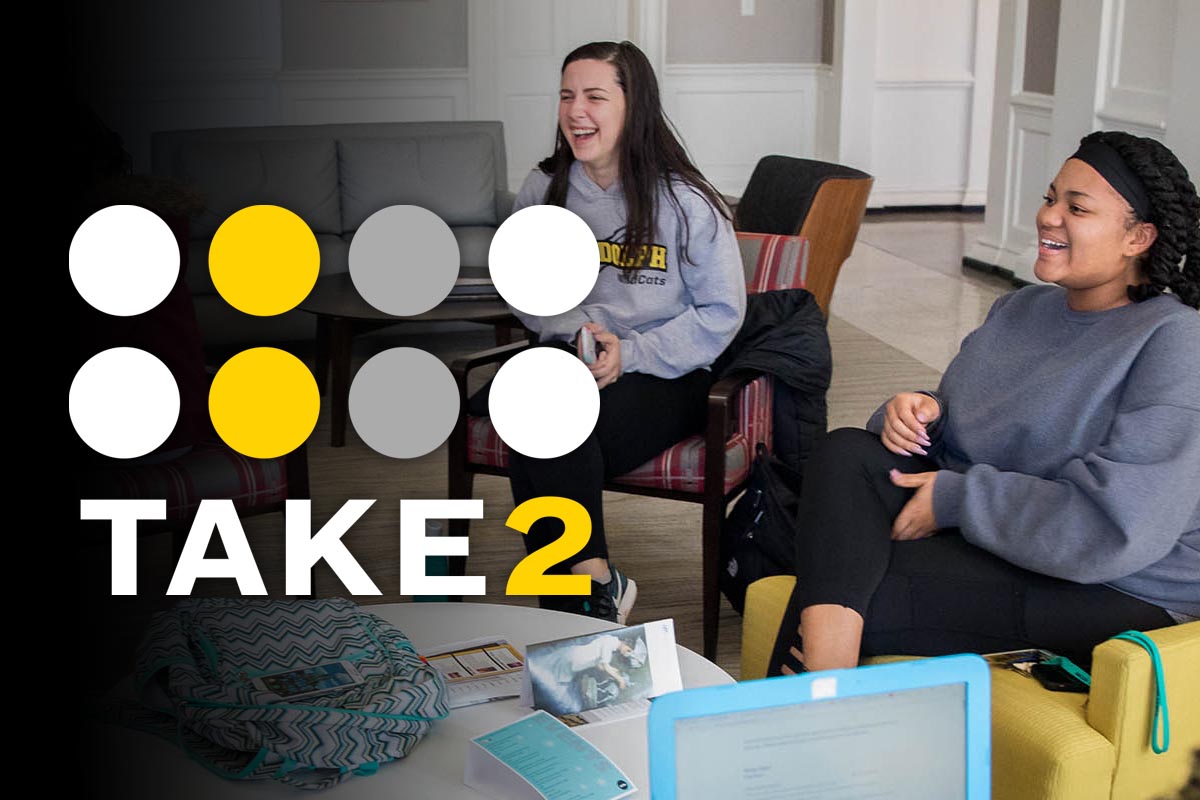Q&A with new faculty: Justina Licata

Justina Licata
Randolph College’s 2020-21 academic year is officially underway, and there are several new faces among the faculty.
Justina Licata is Randolph’s Ainsworth Visiting Professor of American Culture, a two-year position. This fall, she’s teaching a Life More Abundant course and two history courses: African Americans and The Construction of America, and The Global History of Reproduction.
During her time here, Lincata will focus the American Culture program on the politics of eugenics and neo-eugenics.
Here’s more of what she had to say about the topic, as well as her passion for history, how she’s approaching online learning, and the podcast she created during quarantine:
Where are you originally from and what is your career/educational background?
“I am originally from Southern California, more specifically a smallish town called Yorba Linda in Orange County. I completed my undergraduate degree at Wagner College, a small liberal arts college in Staten Island, and I finished both my master’s and Ph.D. at the University of North Carolina at Greensboro. I just graduated last May, and I am delighted to begin my teaching career here at Randolph College.”
How did you first become interested in your field of study?
“As a child, my parents encouraged a love of history. My mom read books to my sister and me about famous artists, like Vincent van Gough, and significant historical figures like Harriet Tubman. Additionally, my father instilled a nostalgic love of the mid-20th century by encouraging me to listen to Elvis Presley and the Beatles and watch old sitcoms like I Love Lucy. While my parents created this foundation, my 8th grade social studies teacher, Mrs. McLean, helped me realize that studying history was something I wanted to pursue as a career. I was in her class in the fall of 2000 when hanging chads halted the Bush v. Gore presidential election. Mrs. McLean patiently explained to us how this unusual election eventually came to an end, while reminding us that we were living through history. I am forever grateful to her for motivating me to dedicate my career to studying the past and inspiring me to be an enthusiastic teacher.”
What attracted you to the job at Randolph?
“The American Culture Program and its unique approach to teaching and learning is what first attracted me to Randolph College. I was excited to see that the program allows students the time to dive deep into a singular topic. I am so looking forward to working closely with students on a subject I find significant and fascinating.
“Additionally, I was attracted to Randolph because I was eager to teach at a small college. As an undergraduate, I attended a small liberal arts college similar to Randolph, and I benefited greatly from the liberal arts environment. I am thrilled to be teaching at a school that values small class sizes and undergraduate teaching and mentorship.”
Can you tell me more about what you’ll be focusing on as the Ainsworth Professor?
“I plan to focus the American Culture Program on the politics of eugenics and neo-eugenics, with particular emphasis on four major themes: white supremacy, population control politics, constructed gender norms in relation to race and class, and bodily autonomy. Therefore, the program will track the history of forced sterilizations in the United States since the 19th century, while also examining activism against sterilization practices. The program will center on women of color driven movements, like reproductive justice, which is a framework developed by women of color and indigenous women in the 1990s. Their activism draws attention to the unlawful and immoral controls placed on minority women’s bodies and spotlights the ways that women of color often experienced reproductive health discrimination differently than white women. Ultimately, the program will examine the questions: what is eugenics, and how does it continue to impact poor and minority populations?”
Describe your teaching style. What can students expect in your classes?
“I believe classrooms are spaces where both my students learn from me, and I learn from my students. Therefore, my class periods include a lot of conversation. This is especially true when we are examining difficult histories. In these cases, I believe in giving students time and space to discuss these issues and relate them to the present. Further, I focus my larger assignments on building adaptable skills. I hope my students will leave my class with skills that can be applied in their other courses and beyond their college careers.”
How have you adapted your classes to remote learning this semester?
“While we will not be in person this semester, I did not want to lose the important role conversation plays in my classroom. Therefore, I will be meeting virtually with students weekly. Additionally, I have tried to incorporate assignments that speak to the increasing need for virtual and accessible resources. For example, in my African-American history class, each student will create a podcast episode about a book examining the African-American experience. Following the semester, these episodes will be made available to the public. I devised this project with the hope that this student-created podcast will be a virtual source that other students across the country can access.”
What are your initial impressions of Randolph and its students?
“During my interview last spring semester, I was able to meet students on campus, and I was struck by their curiosity and enthusiasm. While I have only spent a week with my classes thus far, I can see that these wonderful traits are shared by many of Randolph’s students. Also, I am so appreciative of the students’ patience as I adjust to teaching in a virtual classroom. I am looking forward to getting to know the students as the semester progresses, and I cannot wait to see them in person when the college reopens!”
What do you like to do outside of the classroom as far as hobbies or other activities?
“I am an avid podcast listener! I especially enjoy listening to podcasts while walking or running outside. Some of my favorite podcasts include the classics like This American Life, RadioLab, and Serial, as well as My Favorite Murder, Slow Burn, Heavyweight, and the first season of The Dream. I love podcasts so much, I even made one during the quarantine. You can listen to my podcast, Choice or Coercion: The Biography of Norplant on Apple podcasts. It examines the ways Norplant, the first subdermal implantable contraceptive device, was used to control poor and minority women’s reproduction in the 1990s.
“I also love cooking big meals, mostly pasta dishes, and spending time with my family, friends, and cat, Charlie.”
Tags: Ainsworth Visiting Professor, American Culture, American Culture Program, faculty, fall 2020, history, Justina Lincata, new faculty
